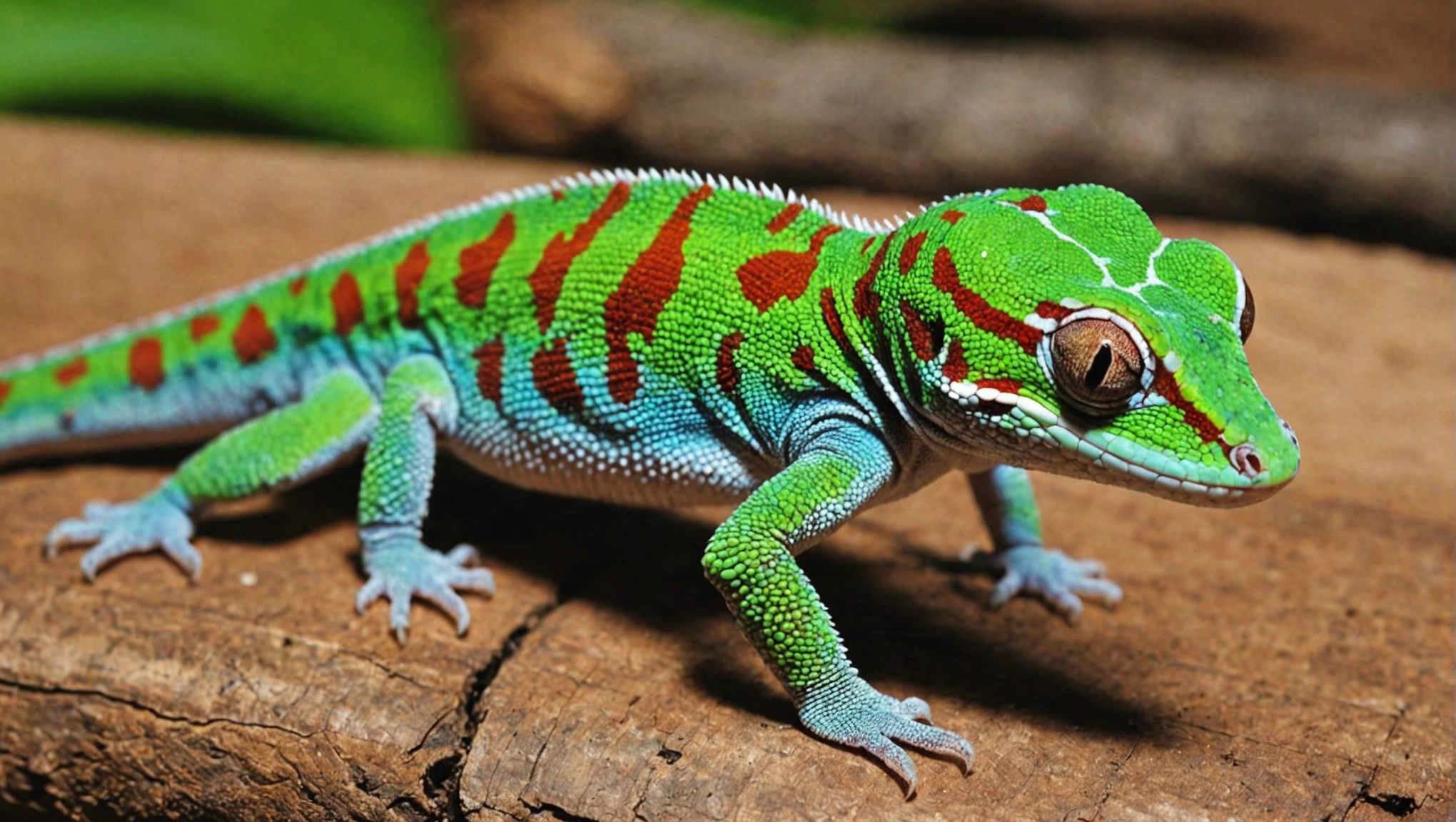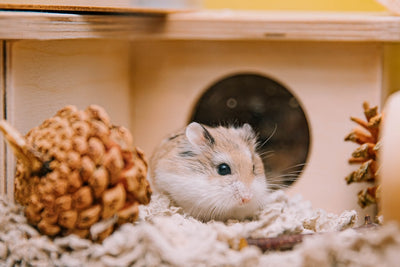Nourishing Your Pet Gecko

Explore the essential aspects of nourishing your pet gecko, from understanding their dietary requirements to discovering a variety of foods that support their well-being and vitality. This comprehensive guide is designed to empower gecko owners, both new and experienced, by providing insights into gecko nutrition and practical feeding advice. By making informed decisions about your gecko's diet, you can contribute to their overall health and longevity. Whether you care for a leopard gecko, crested gecko, or another gecko species, proper nutrition is key to their well-being. Join us on a journey through the world of gecko food and learn how to best nourish your scaly companion for a vibrant and healthy life.
Types of Gecko Food
Live Insects as a Primary Food Source
Geckos are natural hunters and thrive on a diet of live insects. In the wild, geckos primarily feed on live insects like crickets, mealworms, and dubia roaches. These insects not only provide essential nutrients like protein and calcium but also help satisfy the gecko's natural hunting instincts. Opting for gut-loaded insects, which are insects fed with nutrient-rich diets before being fed to the gecko, can further enhance the nutritional value of the prey.
Commercially Available Gecko Diets for Convenience
For pet owners seeking convenience or looking to supplement their gecko's diet, there are commercially available gecko diets in the form of powders or gels. These diets are specially formulated to meet the dietary needs of geckos, ensuring a balanced nutrition profile. They are convenient to store, have a longer shelf life, and can be a practical option when live insects are not readily available or as a part of a varied diet plan.
Benefits of Incorporating Fruits and Vegetables
While live insects are essential for a gecko's diet, incorporating fruits and vegetables can offer additional health benefits. Fruits such as mango, papaya, and berries are rich in vitamins and antioxidants, while vegetables like squash and carrots provide essential minerals and fiber. Including a variety of fruits and vegetables in your gecko's diet can help prevent nutritional deficiencies, support digestion, and boost their immune system.
Importance of Calcium and Vitamin Supplements
In addition to a well-rounded diet, calcium and vitamin supplements are crucial for maintaining your gecko's health. Calcium is essential for bone strength and muscle function, especially in growing geckos and breeding females. Dusting prey items with calcium powder or providing calcium supplements can help prevent metabolic bone diseases. Similarly, vitamin supplements, particularly vitamin D3, are vital for proper calcium absorption and overall metabolic functions.
Hydration and Water Needs
Geckos obtain most of their hydration from the moisture content of their food and their environment. However, providing a shallow water dish in the enclosure is essential to ensure they have access to fresh water at all times. Some geckos may also benefit from occasional misting to maintain proper hydration levels, especially in dry climates or during shedding.
When planning your gecko's diet, it's crucial to offer a diverse array of food options to meet their nutritional requirements and promote their overall well-being. By understanding their dietary needs and incorporating a balanced diet of live insects, commercially available gecko diets, fruits, vegetables, and supplements, you can help your gecko thrive and lead a healthy life.
Nutritional Requirements
Essential Nutrients for Geckos
Geckos require a variety of essential nutrients to maintain their health and well-being. These include proteins, vitamins, minerals, and calcium. Each nutrient plays a crucial role in different bodily functions, such as growth, metabolism, and immune system support. Proteins are essential for muscle development and repair, while vitamins like A, D3, and E are important for various metabolic processes and overall health. Minerals such as calcium are vital for bone health and proper muscle function in geckos.
Striking the Right Balance in a Gecko's Diet
Achieving the right balance of nutrients in a gecko's diet is essential for their overall health. It is important to offer a diverse range of foods to ensure they receive all the necessary nutrients. Some geckos may have specific dietary requirements based on their species, age, or health condition. Consulting with a reptile veterinarian or a knowledgeable breeder can help you tailor your gecko's diet to meet their specific needs. Consider incorporating a variety of feeder insects like crickets, mealworms, and dubia roaches to provide a well-rounded diet. Additionally, offering gut-loaded insects (those fed with nutritious foods) can enhance the nutritional value of the prey items for your gecko.
Supplementation is another aspect to consider in a gecko's diet. Dusting feeder insects with calcium and vitamin powders can help prevent nutritional deficiencies, especially in growing geckos or females producing eggs. However, it is crucial to strike a balance with supplementation to avoid overloading your gecko with excess nutrients.
Monitoring your gecko's dietary intake and observing their behavior and physical condition is key to ensuring they are receiving adequate nutrition. Adjustments may be necessary based on factors like growth stages, reproductive status, and any health issues. By providing a well-balanced diet tailored to your gecko's specific needs, you can help them thrive and lead a healthy life.
Additional Tips for Ensuring Nutritional Balance:
- Offer a variety of fruits and vegetables in moderation to supplement your gecko's diet with essential vitamins and minerals.
- Ensure proper hydration by providing a shallow water dish for your gecko to drink from. Some geckos may also benefit from occasional misting to maintain humidity levels.
- Avoid feeding your gecko with insects caught from the wild as they may carry parasites or pesticides harmful to your pet.
- Regularly clean and sanitize food and water dishes to prevent bacterial contamination.
- Keep track of your gecko's weight and body condition to monitor their overall health and adjust their diet as needed.
By following these guidelines and being attentive to your gecko's nutritional requirements, you can promote their well-being and longevity.
Feeding Schedule
Importance of a Consistent Feeding Schedule:
Exploring the significance of maintaining a consistent feeding schedule for leopard geckos to support their overall health and well-being. Highlight the impact of irregular feeding patterns on their digestion, metabolism, and behavior.
Optimal Frequency for Feeding Sessions:
Delve into the recommended frequency of feeding sessions for leopard geckos based on their age and dietary requirements. Discuss how young geckos may need to be fed more frequently compared to adults to support their growth and development.
Ideal Timing for Feeding Sessions:
Explain the importance of timing when it comes to feeding leopard geckos. Consider factors such as their natural nocturnal behavior and the best times of the day to offer food to ensure they are active and receptive to eating.
Portion Control Strategies:
Address the concept of portion control in leopard geckos and how it can vary based on both age and size. Provide practical tips on determining appropriate portion sizes to prevent overfeeding or nutritional deficiencies.
Nutritional Considerations:
Discuss the importance of offering a balanced diet to leopard geckos, including live insects and supplemental vitamins and minerals. Highlight the nutritional requirements at different life stages and how to ensure dietary diversity for optimal health.
Monitoring Feeding Behavior:
Guide readers on how to observe and monitor their gecko's feeding behavior to assess appetite, food preferences, and any potential issues that may arise. Emphasize the role of observation in adjusting feeding schedules and portion sizes accordingly.
Hydration Needs:
Touch upon the significance of hydration for leopard geckos and how water should be made available at all times. Explain methods for ensuring proper hydration through water dishes and occasional misting.
Consulting a Vet:
Encourage readers to seek professional advice from a reptile veterinarian regarding their gecko's specific dietary needs, especially in cases of health concerns or unusual feeding patterns.
A well-planned feeding schedule tailored to the individual requirements of leopard geckos is essential for promoting their longevity and vitality. By understanding the nuances of feeding frequency, timing, portion control, and nutritional balance, leopard gecko owners can ensure the optimal care and well-being of their beloved pets.
Supplements and Treats
Understanding the Importance of Supplements for Geckos
Geckos, like all animals, require a balanced diet to stay healthy. However, there are specific situations when supplements become necessary to ensure they are receiving all the essential nutrients. Let's delve deeper into when and why supplements are crucial for the well-being of your gecko:.
Calcium Supplements for Strong Bones
Calcium is vital for geckos to maintain strong bones and overall health. A deficiency in calcium can lead to serious health issues such as soft bones, tremors, and difficulty shedding. If your gecko's regular diet lacks sufficient calcium, supplementation becomes necessary to prevent these problems.
Vitamin Supplements for Optimal Health
In addition to calcium, geckos may require additional vitamins to support various bodily functions. Vitamin deficiencies can have adverse effects on your gecko's health, emphasizing the importance of a well-rounded diet. Commonly recommended vitamin supplements for geckos include vitamin D3 and multivitamins to ensure they receive all the necessary nutrients.
Gut Loading for Nutrient-Rich Prey
Feeding your gecko live insects? Consider the practice of gut loading, which involves feeding nutritious foods to the insects before they are consumed. This process enhances the nutritional value of the prey, ensuring that your gecko receives a diverse range of essential nutrients.
Healthy and Exciting Treat Options for Geckos
While treats should not compromise the balance of your gecko's diet, they can be a delightful addition when offered in moderation. Here are some healthy treat options that can bring joy to your gecko while maintaining their nutritional needs:.
Waxworms: A Decadent Delight
Waxworms, although high in fat, can be a delicious treat for your gecko. However, it's crucial to offer them sparingly due to their fat content. While many geckos adore waxworms, moderation is key to prevent any adverse effects on their health.
Silkworms: Protein-Packed Treats
Rich in protein and low in fat, silkworms serve as a healthier treat option for geckos. These can be given occasionally to introduce variety into your gecko's diet while providing essential nutrients.
Fruit Treats: Nature's Sweet Indulgence
Occasional treats like mango, papaya, and apricots can be a delightful surprise for your gecko. These fruits, rich in natural sugars, should be offered in small quantities to prevent an overload of sweetness.
Remember, treats should complement your gecko's staple diet without overshadowing it. If you have any concerns regarding your gecko's dietary requirements, always seek advice from a qualified veterinarian or reptile specialist to ensure their optimal health and well-being.
Ensuring Food Safety
Properly Preparing Live Food to Enhance Nutritional Value
When it comes to ensuring food safety, one crucial aspect is properly preparing live food. This includes fruits, vegetables, and other fresh produce. Proper washing and handling techniques can not only help in removing harmful bacteria and pesticides but also preserve the nutritional value of the food. To further enhance the nutritional benefits of live food, consider incorporating various preparation methods such as blanching, steaming, or consuming raw based on the type of produce. Each method can have different effects on the nutrient content of the food, so it's essential to choose the best approach to maximize the nutritional value.
Identifying and Avoiding Harmful Foods
Another crucial element of food safety is the ability to identify and avoid harmful foods. In addition to understanding general food safety guidelines, it's important to stay informed about specific food recalls and warnings. Check the expiration dates on food items and be vigilant for signs of spoilage, such as unusual odors, discoloration, or changes in texture. By being proactive in recognizing potential risks associated with certain foods, you can protect yourself and your loved ones from foodborne illnesses. Stay informed about the latest food safety practices and guidelines to maintain a healthy and safe diet.
Importance of Proper Cooking Temperatures
Cooking food to the right temperature is critical in ensuring food safety. Different types of food require specific internal temperatures to kill harmful bacteria and pathogens. Invest in a food thermometer to accurately measure the internal temperature of meats, poultry, and seafood. Ground meats should be cooked to at least 160°F (71°C), poultry to 165°F (74°C), and seafood to 145°F (63°C). By following these guidelines, you can prevent foodborne illnesses and enjoy your meals safely.
Storage Practices for Food Safety
Proper storage of food is equally important in maintaining food safety. Be mindful of how you store perishable items in the refrigerator to prevent cross-contamination. Store raw meats on the bottom shelf to avoid drips onto other foods, and use airtight containers to store leftovers. Check the refrigerator temperature regularly to ensure it is below 40°F (4°C) to inhibit bacterial growth. Additionally, ensure that your pantry is free from pests by storing dry goods in sealed containers. By implementing good storage practices, you can prolong the shelf life of your food and reduce the risk of foodborne illnesses.
Regular Cleaning and Sanitizing
Maintaining a clean kitchen environment is essential for food safety. Regularly clean countertops, cutting boards, utensils, and appliances to prevent the spread of bacteria. Use hot, soapy water to wash surfaces and utensils after preparing raw foods. Sanitize kitchen surfaces with a mixture of bleach and water to kill lingering bacteria. Pay attention to high-touch areas like refrigerator handles and faucet knobs. By incorporating proper cleaning and sanitizing practices into your routine, you can create a hygienic kitchen environment and reduce the risk of food contamination.
Conclusion
Ensuring food safety is a multifaceted process that involves proper food preparation, identification of harmful foods, adherence to cooking temperatures, storage practices, and regular cleaning. By following these guidelines and staying informed about food safety best practices, you can protect yourself and your family from foodborne illnesses. Remember that food safety is a shared responsibility, and each individual plays a crucial role in maintaining a safe and healthy food environment. Embrace these practices as part of your daily routine to enjoy meals that are not only delicious but also safe for consumption.
Conclusion
Providing proper nutrition is essential for the health and well-being of your pet gecko. By following the guidelines outlined in this guide, you can ensure that your gecko receives a balanced diet that meets its nutritional needs. Remember to offer a variety of live insects, fruits, and vegetables, and consider supplements when necessary. With the right approach to feeding, you can help your pet gecko thrive and live a long, healthy life.






